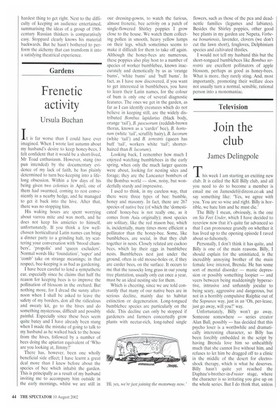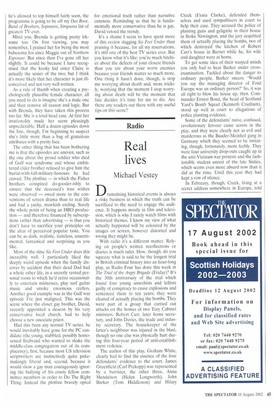Television
Join the club
James Delingpole
This week I am starting an exciting new club. It is called the Kill Billy club, and all you need to do to become a member is email me on Jamesdel@dircon.co.uk and say something like: 'Yes, we agree with you. You are so wise and right. Billy is horrible, we hate him and he must die.'
The Billy I mean, obviously, is the one on Six Feet Under, which I have decided to rereview now that it's quite far advanced so that I can pronounce grandly on whether it has lived up to the opening episode I raved about so fulsomely.
Personally, I don't think it has quite, and Billy is one of the main reasons. Billy, I should explain for the uninitiated, is the incredibly annoying brother of the main female love interest, Brenda. He has some sort of mental disorder — manic depression or possibly something loopier — and veers between being maddeningly hyperactive, intrusive and unfunnily jocular to being scary, aggressive and dangerous, but not in a horribly compulsive Ralphie out of the Sopranos way, just in an 'Oh, per-lease, just go away, will you?' way.
Unfortunately, Billy won't go away. Someone somewhere — series creator Alan Ball, possibly — has decided that this psycho loser is a worthwhile and dramatically interesting character, so Billy has been forcibly embedded in the script by having Brenda love him so unhealthily much that she cannot live without him, and refuses to let him be dragged off to a clinic in the middle of the desert for electroshock therapy, which is what he deserves. Billy hasn't quite yet reached the Daphne's-brother-in-Frasier stage, where the character is so irritating you give up on the whole series. But I do think that, unless he's allowed to top himself fairly soon, the programme is going to be off my Das Boot, Band of Brothers, Sopranos, Simpsons list of greatest TV ever.
Mind you, Brenda is getting pretty irksome too. On first viewing, you may remember, I praised her for being the most babesome fox since Maggie out of Northern Exposure. But since then I've gone off her slightly. It could be because I have recognised that the kooky kid sister Claire is actually the sexier of the two; but I think it's more likely that her character is just illconceived and not very well written.
As a rule of thumb when creating a psychologically plausible female character, all you need to do is imagine she's a male one and then remove all reason and logic. But with Brenda, they have taken this process too far. She is a total head case. At first her irrationality made her seem pleasingly unpredictable. Half a dozen episodes down the line, though, I'm beginning to suspect she's little more than a bag of gratuitous attributes with a pretty face.
The other thing that has been bothering me is that the episodes are uneven, such as the one about the proud soldier who died of Gulf war syndrome and whose embittered elder brother refused to give him the burial-with-full-military-honours he had craved. The plotline — in which the Fisher brothers conspired do-gooder-ishly to ensure that the deceased's true wishes were observed — owed more to the conventions of screen drama than to real life and had a yucky, mawkish ending. Surely the whole point of being an HBO production — and therefore financed by subscriptions rather than advertising — is that you don't have to sacrifice your principles on the altar of perceived popular taste. You can be as dark, realistic, tasteless, unsentimental, fantastical and surprising as you like.
Most of the time Six Feet Under does this incredibly well. I particularly liked the deeply weird episode when the family discover by accident that their dead Dad had a whole other life, in a secretly rented personal room to which he'd retire occasionally to entertain mistresses, play surf guitar music and smoke enormous reefers. Another good example was in the Gulf war episode I've just maligned. This was the scene where the closet gay brother, David, recently appointed a deacon by his very conservative local church, had to help choose a new associate priest.
Had this been any normal TV series, he would inevitably have gone for the PC candidate (the young, stubbled, possibly homosexual firebrand who wanted to shake the middle-class congregation out of its complacency), first, because most US television scriptwriters are instinctively quite pukemakingly liberal and, second, because it would show a gay man courageously ignoring the bullying of his crusty fellow committee members in order to Do The Right Thing. Instead the plotline bravely opted
for emotional truth rather than narrative cuteness. Reminding us that he is fundamentally more conservative than he is gay, David vetoed the trendy.
It's a shame I seem to have spent more of this review slagging Six Feet Under than praising it because, for all my reservations, it's still one of the best TV series ever. But you know what it's like: you're much bitchier about the defects of your closest friends than you are about your worst enemies because your friends matter so much more. One thing it hasn't done, though, is stop me worrying about death and, more trickily, worrying that the moment I stop worrying about death will be the moment that fate decides it's time for me to die. Are there any readers out there with any useful tips on this score?



























































 Previous page
Previous page